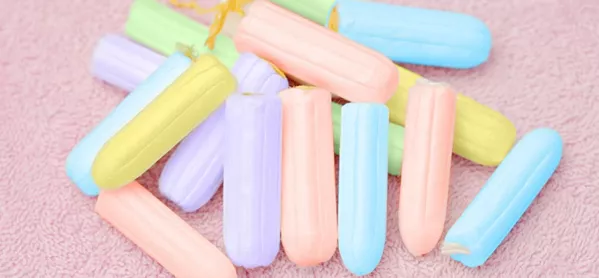- Home
- ‘Periods aren’t shameful - let’s talk about them in school’
‘Periods aren’t shameful - let’s talk about them in school’

The policy to provide free sanitary products in Scottish schools is well under way and it was announced in March that England would be following suit from September.
In Scotland it’s going well. But there’s something still missing from the programme, and it’s probably the key ingredient to its success - education.
Yes, there are schools like Stirling High School, which have led the way in increasing access not only to pads and tampons, but also to inclusive, positive conversations about periods. After a six-week pilot, the school reported an 84 per cent increase in student confidence in talking about periods.
Other schools have been similarly creative, adopting innovative ways of delivering sanitary products and making their students part of the process. But then again, many more schools have hidden their free pads and tampons in a cupboard and locked the door.
Quick read: Free sanitary products ‘misused’ by pupils
Background: Free sanitary products for college and school students
Opinion: ‘It’s time to end the stigma of period poverty’
This represents a massive wasted opportunity. Not only does this make it unlikely for pupils to get the products they need, it also shuts down all opportunity for an open and honest conversation.
Ending period poverty
Eliminating period poverty is about more than access to products. It’s about ending the stigma that leaves 48 per cent of girls feeling embarrassed by their periods. It’s about supporting young people to stay engaged in lessons and sports throughout secondary school. It’s about ensuring that women understand their bodies, and know when to seek medical help if they need to. Above all, it means providing inclusive, positive education about the human body.
The problem with existing period education is not that it is done badly, but that it is done once. Standard practice is that pupils learn about periods in a girls-only session towards the end of primary school, and then touch on the biology in science lessons at lower secondary. And although some schools are doing more to support pupils with their periods - especially since the introduction of free products - efforts are often isolated and inconsistent.
Staff remain reluctant to include boys in the conversation, perhaps because it cuts down on unwanted giggling. But the effect is to socialise boys into thinking periods are gross and irrelevant, and to make girls think they should keep their periods hidden. In essence, what we teach pupils when we don’t talk about periods is that they are shameful.
Last summer the social enterprise that I work for, Hey Girls, started a wide-ranging piece of research - a conversation to uncover the gaps in current period education. We have worked closely with schools to develop flexible learning materials designed specifically to start conversations about periods and get pupils asking questions. The My Period resources, launched today at Broughton High in Edinburgh, include a pack of 50 cards and a full set of lesson plans and activity ideas. It complements both the Curriculum for Excellence and the new relationships, sexual health and parenting curriculum.
The provision of free products presents an extraordinary opportunity to start conversations that previously never happened - because they were awkward, or there wasn’t time. We need fun, gender-inclusive sessions about periods across all secondary schools, so that all pupils revisit the topic at least once a year.
For early years, our free lesson plans cover the basic biology and practicalities. They move on to help pupils discuss how advertising can shape cultures of shame, how period poverty affects people’s lives, how period products are made and how reusable products can offer a more sustainable future.
By talking about periods little and often, schools can create a culture where it’s no big deal to ask for a tampon, or to miss PE because you’re suffering from cramps. Schools have the power to dismantle the taboo that surrounds menstruation, and shape cultural change for generations to come.
The time is well overdue for periods to come out of the cupboard. Talking about them freely is just as important as handing out free tampons.
Molly Brown is the education programme manager for Hey Girls - a Scottish social enterprise that sells plastic-free period products on a “buy one give one” basis to end period poverty. This week Hey Girls has launched My Period, a new education resource developed in partnership with Scottish schools
Keep reading for just £1 per month
You've reached your limit of free articles this month. Subscribe for £1 per month for three months and get:
- Unlimited access to all Tes magazine content
- Exclusive subscriber-only stories
- Award-winning email newsletters
